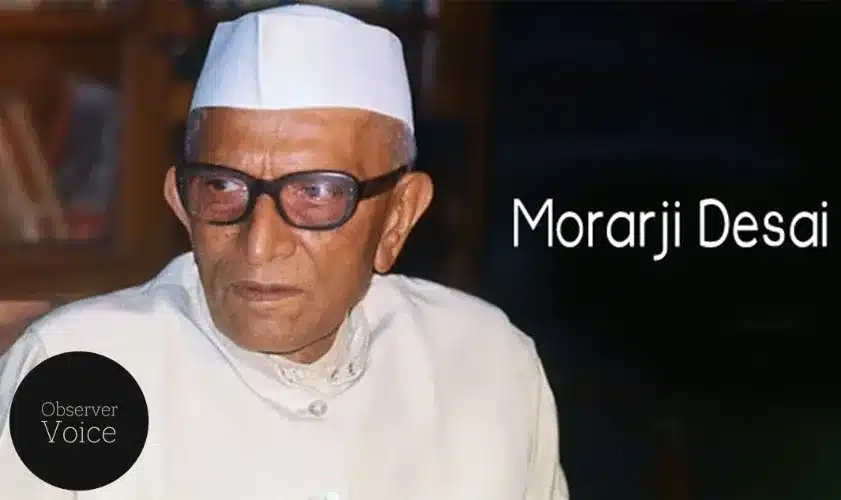Morarji Desai: The Architect of Integrity and Simplicity in Indian Politics

Morarji Ranchhodji Desai (29 February 1896 – 10 April 1995) was an Indian politician and independence activist.
Early Life
Morarji Ranchhodji Desai was born on 29 February 1896, Bombay Presidency, British India. He completed his early education at Kundla School and Bai Ava Bai High School. Later, he received his graduation degree from Wilson College in Mumbai.
In 1918, he joined the civil services. During the riots of 1927-1928, he resigned from Godhra as deputy collector after being found guilty of going soft on Hindus.
As a result of losing faith in the British government, he resigned and joined Mahatma Gandhi’s liberation movement, becoming a member of the Civil Disobedience Movement.
He joined the All-India Congress Committee in 1931, and he served as the Secretary of the Gujarat Pradesh Congress Committee until 1937.
He served as the minister of revenue, agriculture, forests, and cooperatives during the 1937 provincial elections. In 1939, when the Congress governments revolted against India’s involvement in World War II without the consent of its people, they were ousted from office.
Desai was detained during the Mahatma Gandhi Satyagraha, and freed in October 1941, then detained again during the Quit India movement in August 1942 and released in 1945.
Political Career
In 1946, when he was elected to the State Assembly, he became Bombay’s Minister of Home and Revenue. During his tenure, he introduced a few land revenue reforms including providing security tenancy rights that led to ‘land to the tiller’. In addition, the police administration became more responsive to citizens’ needs to protect their lives and property.
In 1952, he became the Chief Minister of Bombay. In 1956, he joined the Union Cabinet, after the States were reorganized. On 22 March 1958, he got the Finance portfolio. His resignation from the Union Cabinet came under the Kamraj Plan in 1963. He was made chairman of the Administrative Reforms Commission by Lal Bahadur Shastri.
As Deputy Prime Minister and Finance Minister, he joined Indira Gandhi‘s cabinet in 1967. Indira Gandhi took away his finance portfolio in 1969. Desai agreed that the Prime Minister had the right to switch portfolios but felt his self-respect had been hurt since Smt Gandhi had not even consulted him. So, he resigned as Deputy Prime Minister of India.
Desai stayed with the Organisation Congress when it split in 1969. He was an active member of the opposition. He got re-elected in 1971. During the 1975 Gujarat dissolution, he remained on an indefinite fast. After his fast, elections were held in June 1975. Janata Front, which included four opposition parties and Independents backing them, won an absolute majority. As a result of the Allahabad High Court’s nullification of Smt. Gandhi’s election, Desai feels that Ms Gandhi should have resigned in keeping with democratic principles.
In 1975, when the Emergency was proclaimed, Desai was arrested. The Lok Sabha elections were announced just a few days before he was released from solitary confinement on 18 January 1977. During the General Elections held in 1977 for the Sixth Lok Sabha, he campaigned vigorously across the country. He played an instrumental role in helping the Janata Party win the election. Shri Desai is a member of the Lok Sabha from Surat, in Gujarat. On 24 March 1977, he was sworn in as Prime Minister of India and unanimously elected Leader of the Janata Party in Parliament.
Award
In 1991, he received the Bharat Ratna, the highest civilian award of India. In 1990, he was awarded with the Nishan-e-Pakistan, the highest civilian award of Pakistan.
Read More; Jaya Bachchan, an Indian actress
Observer Voice is the one stop site for National, International news, Sports, Editor’s Choice, Art/culture contents, Quotes and much more. We also cover historical contents. Historical contents includes World History, Indian History, and what happened today. The website also covers Entertainment across the India and World.

